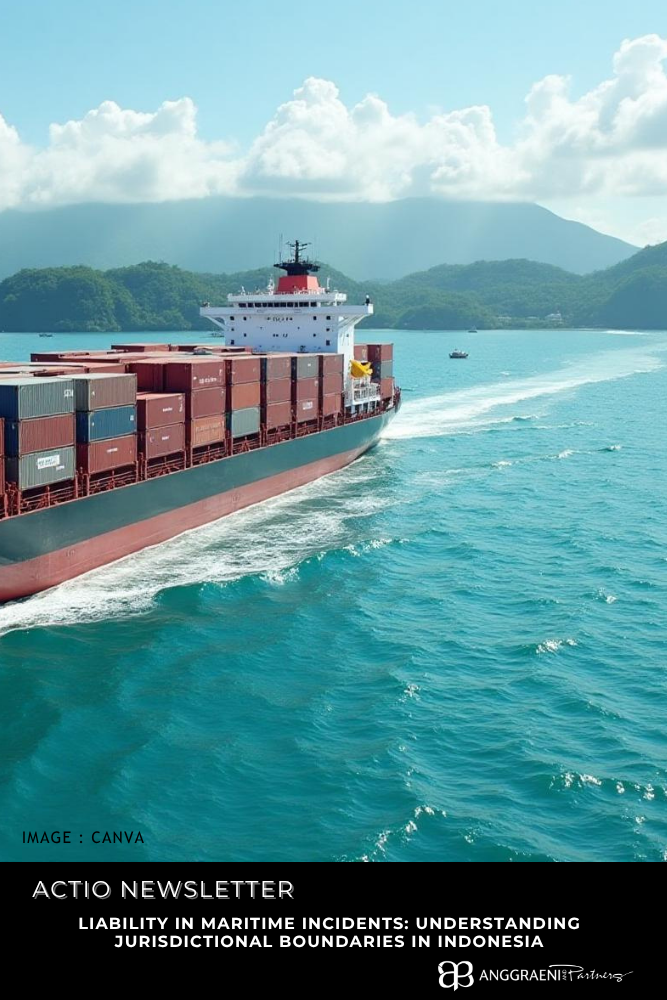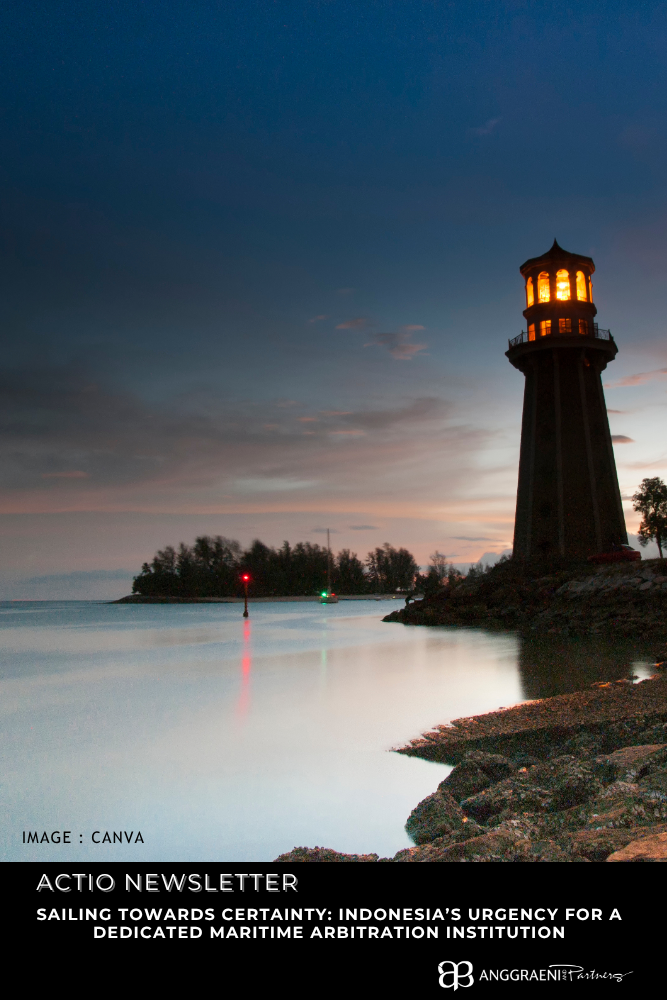Riding the Wave: Whether Carbonbid is The Future Method to Decarbonize Maritime Sector in Indonesia
by Setyawati Fitrianggraeni, Alicia Daphne Anugerah
-
Introduction
In May 2025, the Port of Rotterdam launches a new decarbonization movement in order to lower the carbon footprint and create sustainability in the area of the Port.[1] The initiative, Carbonbid is a €3.5 million pilot funding program designed to support businesses in cutting greenhouse gas emissions in Rotterdam’s port zone. This initiative is part of the Port’s broader plan to prepare for the future and promote sustainability in the maritime sector, particularly among business owners operating in the port area. As a country committed to reducing emissions, Indonesia can leverage Carbonbid as a platform to engage all stakeholders in its sustainability efforts. This approach ensures that the responsibility for cutting carbon emissions is not solely on the government but shared among businesses and organizations, fostering collective action toward a greener future. This article will explore the concept of Carbonbid and its potential application in Indonesia to reduce carbon emissions in the maritime sector.
-
Overview of Carbonbid
Referring to the Tender Guide Carbonbid released by the Port of Rotterdam, it is mentioned that the objective of this movement is quite simple and straightforward, which is to “reduce as many greenhouse gases as possible in the port emission area before Januari, 1 2030”. Through the Carbonbid initiative, companies are encouraged to take proactive steps in creating and executing sustainability plans that align with their goals and enhance their ecological performance. The winner of the Carbonbid will receieve financial aid and offered a standard contract for the execution of their own ideas. Carbonbid targets stakeholders at almost all levels, including companies based in ports, service providers, logistics companies, and manufacturers of machinery and equipment, as well as start-up companies.
Another interesting objective listed in the Guide is how the Port describes carbon reduction. The Port asserts that the carbon reduction means that this initiative aims to lower the greenhouse gases emission, not relocate the emission. Although the Port does not explicitly mention, the idea to terminate the chance of carbon relocation might be because it does not eradicate carbon footprint. It is evident that carbon footprint is number one cause of temperature rising.[2] In general, any type of travel, relocation, or physical move has an environmental impact.[3] This is mainly due to the emissions created by travel and shipping.[4] From private cars to commercial aircraft, container vessels to delivery trucks, every transportation method depends predominantly on fossil fuels, emitting carbon dioxide and other heat-trapping gases. The collective impact is overwhelming, nearly 25% of worldwide CO₂ output comes from transportation, dramatically speeding up global warming. Even daily activities, such as, driving to the office or receiving online purchases feed into this escalating crisis, as expanding global trade networks and urban growth make carbon-heavy transit systems increasingly unavoidable. Hence, the stressing of carbon reduction instead of carbon relocation in the Carbonbid scheme is essential.
It is apparent that the the Carbonbid initiative’s themes are applicable and measurable. The Port does not seek for a hypothetical action from the stakeholders, the Port demands that the ideas and action must be measurable, demonstrable, and verifiable. This means that any emission reduction must be: (1) measurable in tonnes of CO₂ equivalent, (2) provably achieved, and (3) verifiable through independent financial auditing. This demonstrates that the Port evaluates not just the innovative qualities of proposals but also their financial viability. As part of the funding requirements, the Port mandates thorough financial reviews conducted by qualified accountants, underscoring its commitment to verifiable and accountable processes.
-
Existing Regulations in Indonesia
Up untill this day, no existing regulations specifically mandate incentives for businesses that have reduced their carbon emissions. However, the proposed New Energy and Renewable Energy Bill (“The Draft”) has become a focal point of discussion among lawmakers and legal professionals. This Draft represents a promising opportunity for Indonesia to establish clear frameworks and incentives for emission reduction initiatives. This Draft regulates about several types of incentives, for instance, import duty relief or reduction for company who produces new and renewable enegry. Supposedly, this Draft was meant to be implemented in 2022, however, it is still under deliberation for approval. The lack of consensus on critical matters such as expanding high-capacity power transmission networks indicates insufficient governmental readiness to pursue comprehensive sustainable energy solutions, particularly in the maritime energy sector. Hence, a comprehensive regulation regarding carbon emission reduction and its incentive is urgently needed for Indonesia to effectively drive decarbonization efforts.
-
Prospect of Carbonbid in Indonesia
Even if the Port’s Carbonbid is created as a tender, Indonesia as a large maritime nation can model the Carbonbid scheme and turn in into national law. By doing so, the government can offer incentives in more diverse ways, not only limited to tax waivers but also grants, low-interest green loans, or procurement for those businesses who comply. Adopting the Carbonbid framework nationally would also democratize decarbonization, enabling smaller enterprises and startups to participate through streamlined requirements or simplified verification processes. For instance, smaller scale businesses could earn credits for carbon emissions reductions, while larger corporations might bid on high-impact carbon reduction projects. This inclusive approach would align with Indonesia’s Just Energy Transition Policy, ensuring no actor is left behind in the shift to sustainability. Moreover, embedding Carbonbid into law would signal Indonesia’s commitment to global climate leadership, potentially attracting international green investment and partnerships.
-
Remarks
Decarbonization has moved beyond theory, decarbonization is a concrete action that needs to be realized. All sectors, including maritime sectors needs to constantly improvise and create innovation to raise awareness and immediate response to lower carbon emission. The Port of Rotterdam’s Carbonbid initiative offers a practical blueprint for sustainable shipping that Indonesia could implement, not just for maritime but across other sectors too. Carbonbid can enrich the potential ideas for incentives as long as all stakeholders, especially the lawmakers are aware that decarbonization requires colaboration with businessowners, in this context the businessowners in the maritime sectors. At its core, fighting climate change is not just one country’s or industry’s responsibility, it demands global coordination and colaboration to protect our oceans and planet for future generations.
Bibliography
Journal:
Petr Procházka et al., “Corporate sustainability in global staff mobility: relocation policy strategy and carbon footprint” Prague University of Economics and Business Department of International Business”
Internet:
Syed Rakin Rahman, ‘Port of Rotterdam launches sustainability initiative’ Port Techonolgy Internasional, https://www.porttechnology.org/news/port-of-rotterdam-launches-sustainability-initiative/
[1]Syed Rakin Rahman, ‘Port of Rotterdam launches sustainability initiative’ Port Techonolgy Internasional, https://www.porttechnology.org/news/port-of-rotterdam-launches-sustainability-initiative/ accessed 11 Juni 2025.
[2] Petr Procházka et al., “Corporate sustainability in global staff mobility: relocation policy strategy and carbon footprint” Prague University of Economics and Business Department of International Business”, pg. 2.
[3] Ibid, pg. 5.
[4] Ibid.
DISCLAIMER :
This disclaimer applies to the publication of articles by Anggraeni and Partners. By accessing or reading any articles published by Anggraeni and Partners, you acknowledge and agree to the terms of this disclaimer:
-
During the preparation of this work, the author(s) may use AI-assisted technologies for readability. After using this tool/service, the author(s) reviewed and edited the content as needed for the purposes of the publication.
-
No Legal Advice: The articles published by Anggraeni and Partners are for informational purposes only and do not constitute legal advice. The information provided in the articles is not intended to create an attorney-client relationship between Anggraeni and Partners and the reader. The articles should not be relied upon as a substitute for seeking professional legal advice. For specific legal advice tailored to your individual circumstances, please consult a qualified attorney.
-
Accuracy and Completeness: Anggraeni and Partners strive to ensure the accuracy and completeness of the information presented in the articles. However, we do not warrant or guarantee the accuracy, currency, or completeness of the information. Laws and legal interpretations may vary, and the information in the articles may not be applicable to your jurisdiction or specific situation. Therefore, Anggraeni and Partners disclaim any liability for any errors or omissions in the articles.
-
No Endorsement: Any references or mentions of third-party organizations, products, services, or websites in the articles are for informational purposes only and do not constitute an endorsement or recommendation by Anggraeni and Partners. We do not assume responsibility for the accuracy, quality, or reliability of any third-party information or services mentioned in the articles.
-
No Liability: Anggraeni and Partners, its partners, attorneys, employees, or affiliates shall not be liable for any direct, indirect, incidental, consequential, or special damages arising out of or in connection with the use of the articles or reliance on any information contained therein. This includes but is not limited to, loss of data, loss of profits, or damages resulting from the use or inability to use the articles.
-
No Attorney-Client Relationship: Reading or accessing the articles does not establish an attorney-client relationship between Anggraeni and Partners and the reader. The information provided in the articles is general in nature and may not be applicable to your specific legal situation. Any communication with Anggraeni and Partners through the articles or any contact form on the website does not create an attorney-client relationship or establish confidentiality.
-
By accessing or reading the articles, you acknowledge that you have read, understood, and agreed to this disclaimer. If you do not agree with any part of this disclaimer, please refrain from accessing or reading the articles published by Anggraeni and Partners.
Setyawati Fitrianggraeni serves as Managing Partner at Anggraeni and Partners in Indonesia and Assistant Professor at the Faculty of Law, University of Indonesia, while pursuing her PhD at the World Maritime University in Malmö, Sweden, where she leads a legal research team focused on Ocean Maritime Climate. The team includes researchers Alicia Daphne Anugerah.
For further information, please contact:
P: 6221. 7278 7678, 72795001
H: +62 811 8800 427
Anggraeni and Partners, an Indonesian law practice with a worldwide vision, provides comprehensive legal solutions using forward-thinking strategies. We help clients manage legal risk and resolve disputes on admiralty and maritime law, complicated energy and commercial issues, arbitration and litigation, tortious claims handling, and cyber tech law.
S.F. Anggraeni
Managing Partner
Alicia Daphne Anugerah
Legal Researcher
alicia.da@ap-lawsolution.net



